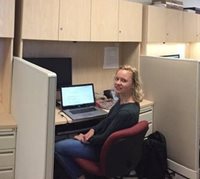“The Shope Fellowship provides an opportunity for young investigators to gain important field experience under the mentorship of ASTMH and ACAV. I am really excited to present the results of our study at next year’s ACAV meeting and get feedback from this group of arbo-experts!” – Amy Krystosik, PhD
Amy Krystosik is a post-doctoral scholar in the Stanford University School of Medicine Department of Pediatric Infectious Disease and the 2017 recipient of the Society’s Robert E. Shope International Fellowship. The Fellowship provides $25,000 in support for international training opportunities in arbovirology and emerging diseases for those with an MD, DVM, PhD or the equivalent. Her work focuses on the epidemiology and geography of arboviruses in Kenya, Grenada, and Brazil. The Shope Fellowship is helping her test a Smart Tube specimen-sparing platform in Msambweni, Kenya. The compact automated system is being tested for whole blood processing that allows for immune stimulation in remote regions of the world. It has countless applications, including vaccine trial monitoring, infectious disease prevalence and treatment studies, pathogenesis studies and other clinical research. Dr. Krystosik conducts her research from the lab of Stanford University Associate Professor of Pediatrics (Infectious Diseases) Desiree LaBeaud, MD, who also chairs the Society’s American Committee on Arthropod-Borne Viruses (ACAV) subgroup.
 Can you talk a bit about the other applications that the system you are testing could offer?
Can you talk a bit about the other applications that the system you are testing could offer?
Assays of cellular immunity are key to understanding the pathogenesis and mechanisms of control of viral and other infectious diseases. Our collaborators have developed a sample-sparing and fully automated fluidics cartridge version of the Smart Tube System that will use 80 percent less blood per donor, allowing use on pediatric participants. This could have applications for vaccine research in hard to reach populations and especially in pediatrics, a group that is often neglected in research.
Where in this project do you feel your mentors will be the most valuable?
Dr. LaBeaud is an ideal role model of a field epidemiologist. I learn so much from her every day but especially about collaborations. She has been conducting epidemiologic research on arboviruses for over a decade in Kenya and has established successful collaborations with international researchers and institutions.
We know the Shope Fellowship offers $25,000 in support, but aside from that, what was it about this fellowship that engaged you?
I am committed to controlling arboviruses in low-resource settings as demonstrated by my previous PhD field work with the Universidad ICESI and the Secretary of Health in Cali, Colombia, focused on understanding the epidemiology and spatial patterns of arboviral outbreaks. The Shope Fellowship provides an opportunity for young investigators to gain important field experience under the mentorship of ASTMH and ACAV. I am really excited to present the results of our study at next year’s ACAV meeting and get feedback from this group of arbo-experts!
A final question we ask of everyone: You get the opportunity to go back in time. You can either have a conversation with any scientist who has ever lived OR observe a moment of scientific history. What would you choose and why?
I really enjoyed reading
The Ghost Map about John Snow’s work on the cholera outbreak and the Broad Street pump. It would be fun to map out cases back before (the Geographic Information System) was a thing.